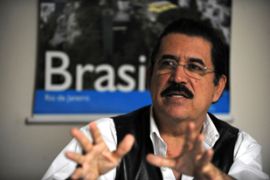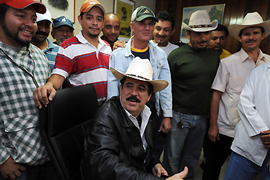Honduras unity talks ‘fail’
Ousted president says he will not support government headed by the de facto leader.

“Sources here tell me that if there is any sign of progress, the deadline to confirm a unity cabinet will be extended,” she said.
“The National Resistance Front, a group supporting Zelaya, also said that if the deposed president is not reinstated by midnight local time, they will call for a boycott of the November elections. They also warn that unrest in this country will escalate.”
Under a deal brokered by the US last week, a Honduran unity government was to be established on Thursday.
No deadline
The decision about whether to reinstate Zelaya was left to the Honduran congress, but the deal did not include a deadline for politicians to decide on his possible return.
Zelaya’s refusal to support a national unity government came after he accused Micheletti of seeking to buy more time until polls for a new president at the end of the month.
Zelaya, who has been living in the Brazilian embassy in Tegucigalpa since his return in September, decided on Thursday that he would not present any candidates for the unity government, according to Rasel Tome, a Zelaya adviser.
 |
| Zelaya’s supporters have warned if he is not reinstated, violence will escalate [AFP] |
“If there’s no president, who will swear them [the new ministers] in?” Tome told AFP news agency.
The crisis deal, signed last Friday, calls for a unity government to start work on November 5.
It also calls for a return to the situation prior to June 28, when soldiers escorted Zelaya out of the country, and calls for the congress to vote on his return.
It provides no alternative if politicians reject the vote.
Jose Angel Saavedra, the president of the congress, said on Thursday that the 128-member body would not “avoid the historic responsibility” of deciding on Zelaya’s return to power, but failed to give a date for the vote.
Zelaya was forced from power on June 28, the same day that he planned to hold a non-binding referendum on changes to the constitution that had faced opposition in the country’s congress and supreme court.
Opponents of the ousted leader say that the public vote was intended to measure support for an extension to presidential term limits, in Zelaya’s favour.
Zelaya has dismissed those claims, saying that the vote was aimed at improving the lives of the poor in the nation of 7.6 million people.